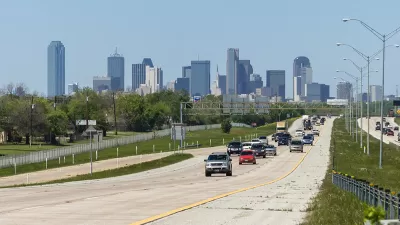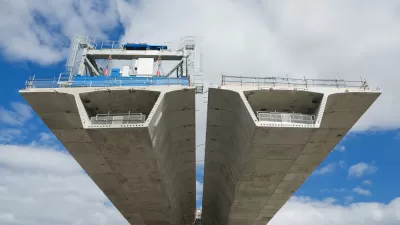From his home in Brainerd, Minnesota (population 13,500), this fiscally conservative engineer leads a growing movement. His slow-and-steady approach to urban development has real bipartisan appeal.

As a civil engineer, Charles Marohn used to oversee projects that widely overshot the mark, providing unnecessary infrastructure and saddling towns with inflated costs. He realized that the suburban mainstream offered "solutions that not only encouraged sprawl, but also created places that were financially unsustainable."
Peter Callaghan reports on the man behind Strong Towns, first a blog and now a non-profit dedicated to the economic viability of existing communities.
Marohn is anti-suburb, but he doesn't fit the typical urbanist profile. "He describes himself as a fiscally conservative Republican; most of those who share his philosophy are liberal Democrats. Also, he was a civil engineer first, not a city planner."
"It's a perspective that has led Marohn to conclude that the nation's 70-year experiment with suburban development is a failure — because it is economically unsustainable. That is, the lack of density does not produce tax revenue necessary to cover current services, let alone the long-term costs of maintaining and replacing those services."
In Marohn's words, "Woodbury is going away, no matter what. There is no renewal process. There is no next step in its evolution." He sees both parties as complicit in an "infrastructure cult" dedicated to top-down projects, be they highways or transit. Instead, he says, we should look to the period before the postwar suburban boom for wiser models.
FULL STORY: Why a conservative Republican from northern Minnesota wants to kill the suburbs

Planetizen Federal Action Tracker
A weekly monitor of how Trump’s orders and actions are impacting planners and planning in America.

Maui's Vacation Rental Debate Turns Ugly
Verbal attacks, misinformation campaigns and fistfights plague a high-stakes debate to convert thousands of vacation rentals into long-term housing.

San Francisco Suspends Traffic Calming Amidst Record Deaths
Citing “a challenging fiscal landscape,” the city will cease the program on the heels of 42 traffic deaths, including 24 pedestrians.

Defunct Pittsburgh Power Plant to Become Residential Tower
A decommissioned steam heat plant will be redeveloped into almost 100 affordable housing units.

Trump Prompts Restructuring of Transportation Research Board in “Unprecedented Overreach”
The TRB has eliminated more than half of its committees including those focused on climate, equity, and cities.

Amtrak Rolls Out New Orleans to Alabama “Mardi Gras” Train
The new service will operate morning and evening departures between Mobile and New Orleans.
Urban Design for Planners 1: Software Tools
This six-course series explores essential urban design concepts using open source software and equips planners with the tools they need to participate fully in the urban design process.
Planning for Universal Design
Learn the tools for implementing Universal Design in planning regulations.
Heyer Gruel & Associates PA
JM Goldson LLC
Custer County Colorado
City of Camden Redevelopment Agency
City of Astoria
Transportation Research & Education Center (TREC) at Portland State University
Jefferson Parish Government
Camden Redevelopment Agency
City of Claremont





























